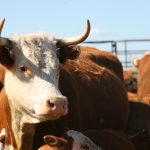R-CALF USA: Ranchers Win First Legal Hurdle in EID lawsuit
Almost a year ago, ranchers filed a lawsuit against the U.S. Department of Agriculture (USDA) alleging the agency’s final rule that mandated the use of electronic identification (EID) eartags for certain adult cattle moved in interstate commerce was unlawful. The ranchers were represented by Kara Rollins, litigation counsel for the New Civil Liberties Alliance (NCLA).
The USDA filed a motion to dismiss the case, but now a federal district court has paved the way for the ranchers to proceed to the next phase in the lawsuit – the summary judgment phase.
Here’s a bit of background and detail:
The USDA’s final rule, the mandatory electronic identification (EID) eartag rule, went into effect Nov. 5, 2024. The final rule replaced a previous rule on animal identification that gave ranchers the choice of using low-cost metal eartags or high-cost EID eartags when transporting sexually intact adult cattle across state lines. But the final rule removed that choice and mandated the exclusive use of the more costly EID eartags.
We viewed the final rule as a clear example of government overreach – an unnecessary and unlawful infringement on the liberties and freedoms of America’s ranchers to choose how best to identify their cattle and run their operations.
We tried hard to stop the mandatory EID rule before it became final. We and other ranch organizations and ranchers filed public comments urging the USDA to withdraw its rule. But the USDA, under the previous administration and despite widespread rancher opposition, bowed its neck and forged ahead to implement the final rule.
We then worked with Congress and successfully encouraged both the House and Senate to introduce a resolution of disapproval that would reverse the final rule if it was passed in both houses. The Senate passed the resolution against the EID mandate, and by a wide margin. Unfortunately, as the 2024 elections loomed, the House of Representatives was unable to pass the resolution introduced by Rep. Harriet Hageman (R-Wyo.).
And, so, to achieve our members’ policy goal of putting an end to the ill-conceived EID mandate, we asked Kara Rollins with the NCLA to file a lawsuit on behalf of independent ranchers to overturn the final rule.
R-CALF USA, the South Dakota Stockgrowers Association, the Farm and Ranch Freedom Alliance, and South Dakota ranchers Kenny and Roxie Fox, and Rick and Theresa Fox joined together as plaintiffs in the NCLA lawsuit against the USDA’s EID mandate on Oct. 30, 2024.
But rather than address the merits of our lawsuit, the USDA responded to our complaint with a motion to dismiss, alleging that we lacked standing to bring the case to the federal court. In other words, the USDA claimed that none of us plaintiffs possessed a personal stake in the outcome of the case.
For example, the USDA argued that plaintiffs did not have standing because they suffered no injury since the final rule allows them to continue using brands and tattoos, which, if true, would mean they would not have to incur the higher cost of EID eartags. But as we argued in the case, brands and tattoos can only be used if both the shipping and receiving states agree, and not all states have such agreements.
The USDA then argued that even ranchers who had to purchase the costly EID tags should not have standing to bring a lawsuit. Fortunately, the court disagreed with the USDA and determined that the ranchers and ranch organizations have standing to sue. This means the case will now proceed to the next phase, the summary judgement phase, where the fight will focus on whether the final rule is necessary under the law.
We, of course, will continue arguing the final rule is unnecessary, as the previous rule that allowed ranchers to choose the type of eartags that best fit their operations is sufficient to meet the USDA’s disease traceback objectives in the event of a disease outbreak. And we’ll point out that the new rule only covers about 10% of the nation’s cattle herd – a percentage well below the percentage of participation the USDA had previously said was needed to achieve disease traceability.
Not only do we believe this mandatory EID rule implemented during the Biden administration is unnecessary and unlawful, but we also believe it flies in the face of President Trump’s efforts to put an end to costly government regulations that force private businesses to incur unnecessary compliance costs that harm their competitiveness. There is no question that this mandatory EID rule is driving up costs for American cattle ranchers.
–Commentary by Bill Bullard, R-CALF USA CEO



